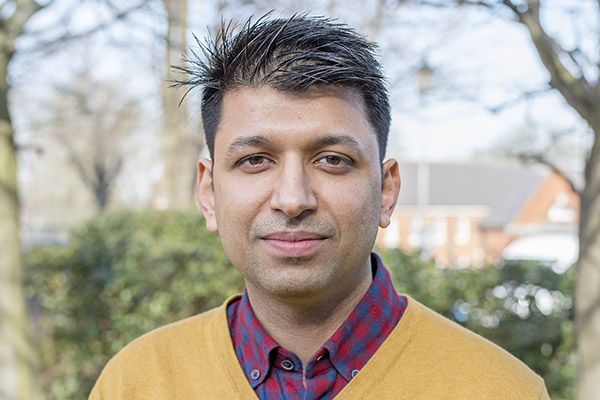Dr Aditya Parmar
Dr Aditya Parmar joined Natural Resources Institute, University of Greenwich, UK as a Crop Postharvest Scientist from the University of Kassel, Germany where he was pursuing his PhD studies. During his PhD studies, he worked in the purview of a GlobE project RELOAD (Reducing Losses and Adding Value in East African Food Value Chains) funded by Federal Ministry for Education and Research (Germany). He was also a full-time holder of DAAD (Deutscher Akademischer Austauschdienst Research) Grant for Doctoral Candidates. The objective of his work as a PhD student was to fill the existing information and data gap on the scale, pattern and causes of food losses along sweet potato and cassava food value chains in the southern region of Ethiopia.
Dr Parmar is a crop post-harvest specialist with expertise and experience in the management and analysis of food supply chains and postharvest biology and technology. His research and enterprise interests lie in the assessment and monitoring of food losses and wastes along the crop value chains and the development of technological and management options to reduce these losses. He is interested in integrating renewable energy technologies such as solar, wind and hydro in postharvest applications, i.e., storage and processing of agricultural produce into value-added products.
- El-Mogy, M. M., Parmar, A., Ali, M. R., Abdel-Aziz, M. E., & Abdeldaym, E.A. (2020). Improving postharvest storage of fresh artichoke bottoms by an edible coating of Cordia myxa gum. Postharvest Biology and Technology,163(January), 111143. https://doi.org/10.1016/j.postharvbio.2020.111143
- El-Mogy, M. M., Wahab, M. A. M., El-Sawy, M. B. I., & Parmar, A. (2019). Pre-Harvest Foliar Application of Mineral Nutrients to Retard Chlorophyll Degradation and Preserve Bio-Active Compounds in Broccoli. Agronomy, 9(11), 711. https://doi.org/10.3390/agronomy9110711
- Parmar, A. (2019). Optimising Agricultural Practices: Saving Food: Production, Supply Chain, Food Waste and Food Consumption. In Charis M. Galanakis (Ed.), Saving Food. Academic Press, Elsevier. https://doi.org/10.1016/c2017-0-03480-8
- Parmar, A., Tomlins, K., Sanni, L., Omohimi, C., Thomas, F., & Tran, T. (2019). Exposure to air pollutants and heat stress among resource-poor women entrepreneurs in small-scale cassava processing. Environmental Monitoring and Assessment, 191(11), 693. https://doi.org/10.1007/s10661-019-7811-7
- Shrestha, L., Parmar, A., Kulig, B., Hensel, O., & Sturm, B. (2019). Feeding practices of pre‐school children and associated factors in Kathmandu, Nepal. Journal of Human Nutrition and Dietetics, jhn.12715. https://doi.org/10.1111/jhn.12715
- Parmar, A., Fikre, A., Sturm, B., & Hensel, O. (2018). Post-harvest management and associated food losses and by-products of cassava in southern Ethiopia. Food Security. https://doi.org/10.1007/s12571-018-0774-7
- Parmar, A., Kirchner, S. M., Langguth, H., Döring, T. F., & Hensel, O. (2017). Boxwood borer heterobostrychus brunneus (Coleoptera: Bostrichidae) infesting dried cassava: A current record from southern Ethiopia. Journal of Insect Science, 17(1). https://academic.oup.com/jinsectscience/article/17/1/14/2805392
- Parmar, A., Kirchner, S. M., Sturm, B., & Hensel, O. (2017). Pre-harvest Curing: Effects on Skin Adhesion, Chemical Composition and Shelf-life of Sweetpotato Roots under Tropical Conditions. East African Agricultural and Forestry Journal, 82(2–4), 130–143. https://www.tandfonline.com/doi/abs/10.1080/00128325.2017.1340141
- Parmar, A., Gebre, B., Legesse, A., Demelash, Y., Fladung, K., & Hensel, O. (2017). Nutritional Comparison of White and Red Coccinia Abyssinica (Lam.) Cong. Accessions: An Under-Utilised Edible Tuber of the Ethiopian Highlands. Foods, 6(8), 71. https://doi.org/10.3390/foods6080071
- Parmar, A., Sturm, B., & Hensel, O. (2017). Crops that feed the world: Production and improvement of cassava for food, feed, and industrial uses. Food Security, 9(5). https://doi.org/doi:10.1007/s12571-017-0717-8
- Parmar, A., Hensel, O., & Sturm, B. (2017). Post-harvest handling practices and associated food losses and limitations in the sweetpotato value chain of southern Ethiopia. NJAS - Wageningen Journal of Life Sciences, 80. https://doi.org/doi:10.1016/j.njas.2016.12.002
- Parmar, A., Nema, P. K., & Agarwal, T. (2014). Biochar production from agro-food industry residues: A sustainable approach for soil and environmental management. Current Science 2014 Vol.107 No.10 pp.1673- 1682 ref.81 1673.pdf (currentscience.ac.in)
- Review Editor on the Editorial Board of Sustainable Food Processing (speciality section of Frontiers in Sustainable Food Systems).
- Member of Editorial Advisory Board of Thermal Science and Engineering Progress (TSEP).
- DAAD (Deutscher Akademischer Austauschdienst e.V., Kennedyallee, 53175 Bonn)
- Research Grants for Doctoral Candidates and Young Academics and Scientists (more than 6 months), 2014/15


